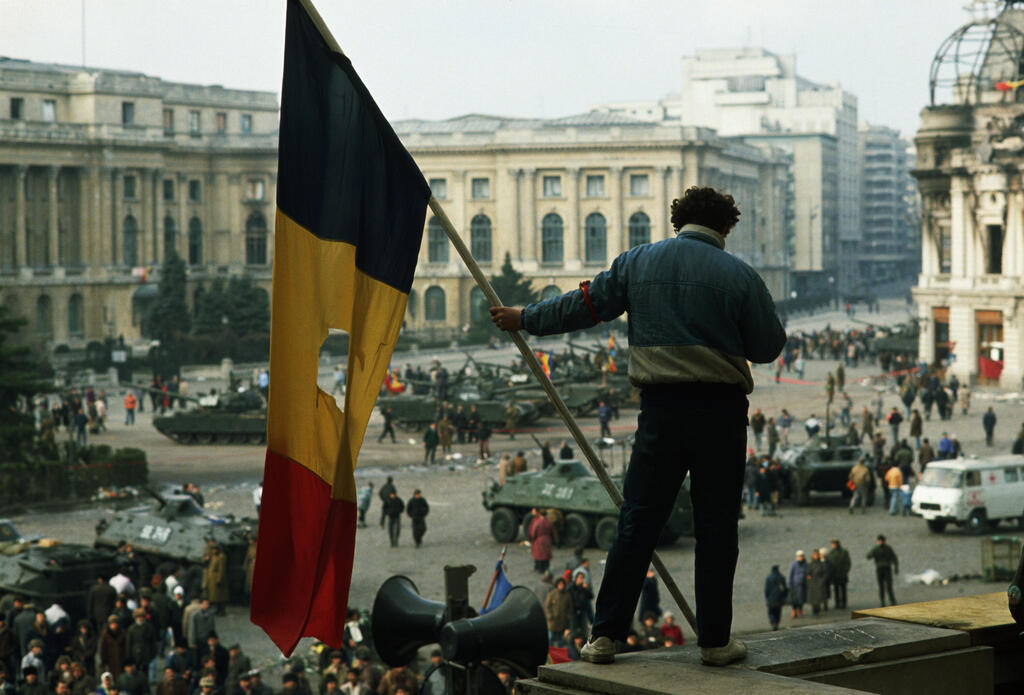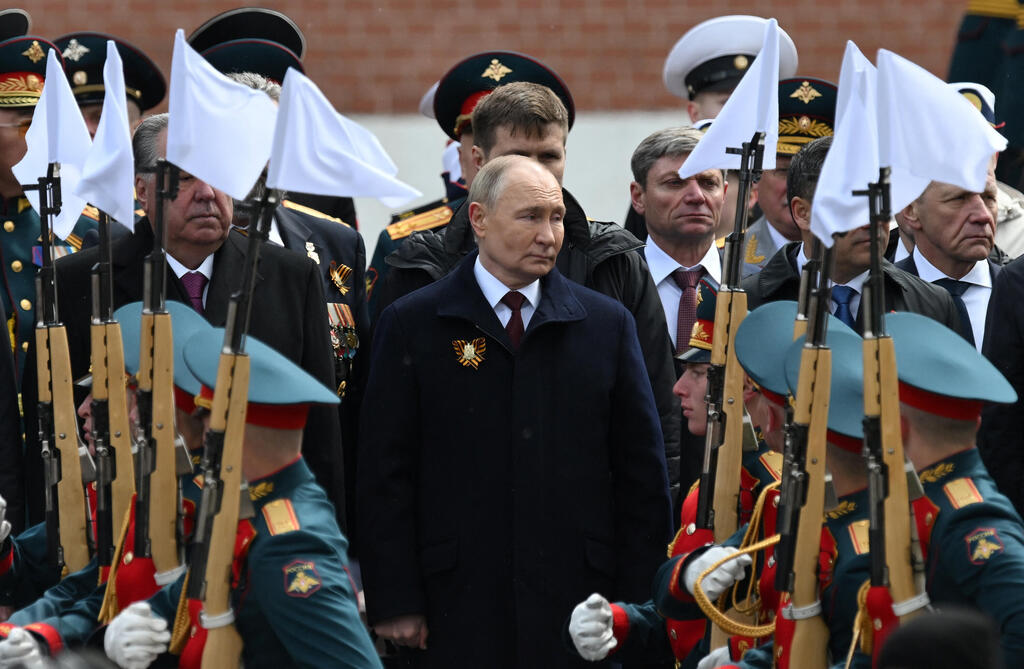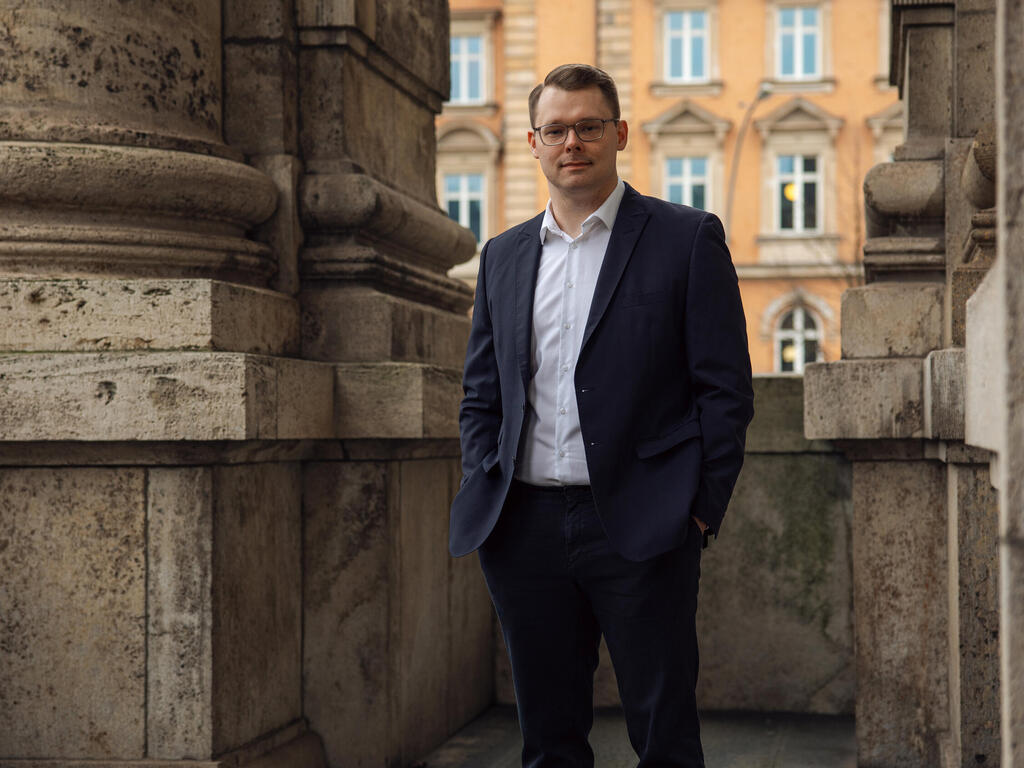
Bringing down dictators: "Contrary to myth, tyrants are fragile. Most fall in the end"
Dr. Marcel Dirsus has studied dictators, from Ceausescu to Gaddafi to Putin, and concludes they are less strong and stable than we think. In a new book, he explains that each of them has a weak point, and that "even if the price is heavy there is room for hope. These people can be brought down, and sometimes it happens in an instant."
When Libyan ruler Muammar Gaddafi landed in Paris in late 2007, the French government welcomed him with the respect typically reserved for the most important dignitaries. In the courtyard of the luxury hotel where he stayed, a spacious tent was erected for meetings, and a red carpet was laid from the hotel entrance. When he wished to sail down the Seine, the bridges along the river were closed to the public, and his entourage—comprising no fewer than 100 vehicles, including an unusually long white limousine—caused severe traffic jams throughout the city. Two years later, at the United Nations, where leaders are generally limited to 15-minute speeches, Gaddafi was allowed to speak for a full 93 minutes.
On one hand, this was surprising. After all, Gaddafi was known as a bloodthirsty dictator who terrorized his people and did not hesitate to imprison or murder his critics. In light of this, why would an enlightened democracy like France or a peace-promoting organization like the United Nations give him such a platform? On the other hand, perhaps it wasn’t surprising at all. The world often treats tyrants with kid gloves, assuming their rule is unbreakable and inevitable. Therefore, it is seen as better not to provoke them, as they are capable of extreme actions.
For example, Vladimir Putin is able to launch a brutal war against Ukraine, destabilize the world, eliminate political opponents—including high-profile figures like Alexei Navalny—amass a personal fortune estimated at $200 billion, and still remain in power. Similarly, Kim Jong Un continues to rule North Korea with an iron grip, launching ballistic missiles at will, and even murdering senior members of his government for trivial offenses, yet he remains firmly in control.
3 View gallery


Celebrations in Bucharest after the overthrow of Ceausescu, 1989
(Photo: Getty Images)
"People who live in liberal democracies have an image of dictators as absolute rulers who hold all the power in the world. There is some myth according to which they can achieve anything they want with the snap of a finger, but this is not true," states Marcel Dirsus, Ph.D. in political science and author of the book "How Tyrants Fall: And How Nations Survive" in an interview with the Calcalist. "Tyrants are much more vulnerable than they seem. And in recent years we have wasted far too much time talking about the fragility of democracies, and not enough about the fragility and weaknesses of dictatorships."
"How Tyrants Fall" was published in Britain earlier this year and has already been included in the list of books of the year by "The Economist" and has been translated into ten languages. For the purpose of writing it, Dirsus spoke with dozens of diplomats, journalists, regime opponents, former spies, nuclear experts and more. "It's not a fun and cheerful book, but it does encourage people to stay positive," Dirsus says. "I wanted to write an antidote to gloom and hopelessness and say: 'Hey, the situation is really tough, and there are heavy prices to pay, but these people can be brought down, things can get better, the potential is there.'"
One of the conclusions of the book is that dictators are constantly under threat and must continually "manage" the political and military elites in their country to prevent betrayal. As a result, they are trapped in the cycle of the Dictatorship Preservation Law, where a single wrong decision can lead to the loss of power, and in some cases, their lives. Just look at what happened to Gaddafi after his government was overthrown.
"Even at the height of his power, when many of his enemies were rotting in the grave or in prison, Gaddafi mainly saw threats around him," says Dirsus. "The walls around his compound were four meters high and a meter thick, and underneath it rustled a network of branching tunnels, which also contained television studios to allow him to broadcast to the nation during a siege. His second compound also had a network of underground tunnels. A man who thinks his future is rosy doesn't need all of these, but Gaddafi knew that his future was not guaranteed. Dictators feel that there is a real need to establish these defenses."
Why?
"Being a dictator is incredibly dangerous. While democratic leaders often look forward to a peaceful retirement, spending time with family and friends, earning money from lectures, or supporting charities, dictators face a very different reality. According to recent research, 69% of dictators end up in prison, exile, or die after being ousted from power. This is the result of what I call the 'dictator treadmill'—once you seize power, you're trapped, as stepping down voluntarily would be extremely dangerous. In this situation, the most rational choice is to do everything possible to stay in power. This constant threat has a profound effect on how these rulers govern and how their political systems function."
Why don't more dictators have good options for retirement?
"Of course, there are leaders who, through a mix of effective governance and some luck, manage to hold onto power for many decades, and some even die in office. There are exceptions, but many will not die while still in power. Even those who manage to stay in power for a long time can never truly relax. They must always be vigilant about potential threats."
How do you define a tyrant? This question is relevant to our discourse in Israel, which is officially a democracy but has been governed by one leader for many years, who has implemented several centralized policies.
"I take a broad approach to defining a tyrant. Ultimately, I wanted to focus on leaders who need only a small portion of the population to come to or remain in power and who govern with brutality in one form or another. Kamala Harris would need tens of millions of votes to become president, but Kim Jong Un only needs the support of a few hundred people, if that, to stay in power in North Korea. Every political system lies somewhere on this spectrum—the more democratic a system is, the more people a leader needs to maintain power."
"Protests are effective even in tyranny"
Dirsus (33) lives in Hamburg, Germany, and is a research fellow at the University of Kiel, as well as a consultant to NATO and the OECD. After earning a BA in Politics and International Relations from the University of Warwick and an MA in East European and Russian Studies from the University of Oxford, he had an unexpected detour—working in a brewery in Congo, he says with a smile. While there, he witnessed a failed military coup attempt, which led him to focus his PhD from Kiel University on unstable regimes: "I thought to myself, I don't understand what's going on here, but I really want to. So I returned to academia to investigate it."
For the past ten years, Dirsus has been researching dictatorships, and he decided to write his book on how tyrants fall for two main reasons. "On one hand, you have dictators rampaging through different parts of the world—going to war, torturing, murdering," he explains. "But on the other hand, there’s the danger that tyranny could arrive at your doorstep, because it can happen anywhere. That was my double motivation: to analyze how these systems work and why these tyrants act as they do, and to explain why we should be prepared if we ever find ourselves in such a system. Many people take their freedom for granted, which is a mistake."
So, how do you overthrow a dictator? The answer is, of course, complex. Statistically, the most effective way is through non-violent protests. According to the research of Prof. Erica Chenoweth from Harvard, which Dirsus cites in his book, 57% of non-violent movements led to the establishment of democracies, compared to just 6% of violent ones. Chenoweth’s "3.5% rule" states that "no revolution has failed once 3.5% of the population mobilized at the peak of resistance, whether through mass protests or other forms of non-cooperation." However, only 18 out of 389 resistance campaigns crossed the 3.5% threshold between 1945 and 2014.
The more entrenched and resource-rich the dictatorship, the harder it is to spark a mass protest. For example, in 2005, Myanmar’s military junta moved the capital from Yangon to Naypyidaw in a move referred to as "dictatorship through cartography," deliberately making demonstrations difficult. "It was unlikely that protests would occur in Naypyidaw for several reasons," Dirsus writes in his book. "First, the city was almost exclusively inhabited by government-connected individuals. But even if potential opposition existed, it wasn’t clear where they would gather. The city was designed with wide boulevards, no public squares, and the presidential palace was surrounded by a defensive canal. This layout limited protesters and allowed security forces to move freely without interference from residents." And this is without even mentioning the ability of leaders like Vladimir Putin and Kim Jong Un to prevent citizens from organizing in the first place.
So, what is your position on mass protests: are they effective or not?
"Mass protests can be very effective, even in deeply entrenched authoritarian regimes. If enough people take to the streets, the regime is forced to make a decision: either allow the protests to continue, which shows they are not in control, or use violence to suppress them. However, using violence risks causing a backlash and could weaken their coalition because of the cost of repression."
When do protests fail to work?
"In dictatorships that are willing and able to use violence against their own citizens, the power of mass protests diminishes because few people are willing to risk their lives to demonstrate. That’s one major issue."
What’s the second problem?
"The unfortunate reality is that in deeply entrenched regimes, protests are less likely to lead to the establishment of democracy. Dictatorships like North Korea are excellent at preventing mass protests from happening in the first place, so there’s little chance that Kim Jong Un will be toppled by popular unrest. On the other hand, in regimes like Iran, such movements can succeed."
Why is it not worthwhile to remove a dictator by force?
Researching dictatorships isn’t easy. While democratic leaders offer numerous opportunities to observe political changes, dictators don’t fall every day. It’s difficult to pinpoint, in real time, the moment when a regime begins to fracture and heads toward collapse. Often, even dictators themselves fail to recognize this moment—though their fate may already be sealed.
A few months before his death, even as his opponents controlled entire cities in Libya, Gaddafi still mockingly referred to them as "rats" and promised to "cleanse Libya house by house." He did not realize that the Arab Spring had already reached him. According to Dirsus, this provides a source of hope.
"When something doesn’t work out, we often tend to think, ‘Of course, it didn’t work out,’” he says. “But because these regimes are so difficult to study, and the information is often incomplete, we rarely know how close we came to a tipping point. When you examine the fall of these leaders and regimes, you can often identify a moment when everyone close to the leader says, ‘I never supported this regime from the start.’ Once that moment arrives, events can unfold very quickly."
Just how fast? In December 1989, just four days after the pro-democracy revolution broke out in Timisoara, Romania—where protesters were killed by the police—dictator Nicolae Ceausescu gave a speech from the balcony of the Communist Party headquarters in Bucharest. After ruling with an iron fist for 24 years, he expected his usual applause, but instead, the crowd erupted in protest against the massacre. State television stopped broadcasting the event. Ceausescu and his wife Elena fled by helicopter, aiming to reach a safe haven. However, while still in the air, the government collapsed, and the army withdrew its support. When they landed, they were captured and subjected to a show trial. Just four days later, they were executed by firing squad.
"Dictators rarely relinquish power voluntarily, unless they realize they are in imminent danger of being ousted or killed," Dirsus explains. "These decisions often have to be made under extreme pressure, which makes the situation much more difficult."
In your book, you describe how finding political asylum is a significant challenge for a dictator, even when pressure is not a factor.
"True. During the Cold War, even leaders who committed unspeakable atrocities could find a quiet and sunny place to retire, such as in France. But today, liberal democracies are much less approving of such measures. A dictator can't just settle for a country willing to protect them now — they need a place that will continue offering protection five or ten years down the line, so the list of options is very short."
Why did liberal democracies offer such 'golden parachutes' to dictators in the first place? Sometimes they chose to do so to prevent an even greater injustice, such as genocide. "Any trade-off in these situations tends to be quite grim," Dirsus says. "But what can you do? If you give dictators an escape route, you undermine efforts to hold them accountable and weaken international law and institutions that have been built with great effort. On the other hand, if you don’t offer an exit, they may continue torturing, murdering, and doing everything they can to cling to power in a crisis. Is there one clear answer? I don’t think so. The boring answer is that it depends."
What about the use of international military force?
"The findings aren’t encouraging. Regime change wars tend to have negative consequences for everyone involved. As someone born in Germany, into freedom, prosperity, and peace, I won't argue that using force to overthrow dictators is always justified. But yes, there are times when the destruction and threat posed by a regime are so severe that intervention becomes necessary."
It’s depressing to hear that overthrowing dictators is always a double-edged sword.
"Everything has a price, even dictators staying in power. Few things in politics are free. There's no simple 'we’ll do this, and everything will be perfect' solution. The costs of each move are often not considered carefully enough."
Rationality in irrational conditions
So, how can outside forces influence the overthrow of a dictator? According to Dirsus' book, a three-pronged strategy is required: weaken the leader, strengthen the elites, and empower the masses. He offers some concrete tips: stop shipments of weapons that can be used by the dictator against their citizens, impose economic sanctions to prevent them from rewarding their allies (the "selectorate"), and disrupt their ability to track and gather information about opponents by cutting off access to surveillance software.
As an example, Dirsus mentions the case of Israeli company NSO in his book: "NSO developed its spyware in Israel and sold it abroad. It's a lot of money, but it’s also a tool for Israeli foreign policy. Since the Israeli government controls which countries receive licenses, it can leverage this to form new partnerships or strengthen existing ones. In the case of the UAE, a license was reportedly granted after Israeli intelligence agents assassinated a senior Hamas official in Dubai. The spyware served as an olive branch. If democracies truly want dictators to fall, they cannot engage in such peace gestures."
And once the pressure seems to be working, it’s time to encourage and support opposition leaders while the dictator fights for survival.
In your book, you use Ugandan activist Bobi Wine as an example to show that dictators may avoid assassinating popular regime opponents to avoid negative press in outlets like The New York Times. But that didn’t stop Putin from trying to eliminate Navalny, and he’s still in the Kremlin. How do you explain that?
"Dictatorships are built on the perception of inevitability. Putin wants people to believe that he is irreplaceable, and that resistance is pointless because no one can take his place. The danger posed by figures like Navalny or other prominent activists is that they expose this lie — they show that alternatives exist and that things can change. That makes them dangerous to dictators."
"Ultimately, it’s a cost-benefit analysis for the dictator: is it more beneficial to eliminate an activist, even at the risk of backlash, or to allow them to continue while using force against the protesters they inspire? In Putin’s case, he took the risk, and it paid off — Navalny no longer posed a significant threat, and the consequences of his actions were minimal. This was partly because Putin had already invested considerable resources in making large-scale protests almost impossible in Russia."
People say that Putin’s grasp on reality is warped, especially during the pandemic when he was surrounded by advisers who only told him what he wanted to hear. But in your book, you emphasize that while these tyrants are often narcissistic, they can be highly rational.
"We tend to think of these rulers as madmen, immune to reason, but that's not true. Although they don’t behave like ordinary people, most dictators are rational within the systems they operate in. Their psychological makeup may be very different from ours, but they must be rational because they constantly face difficult decisions and pay high costs just to maintain their power."
"In the book, I use the example of Francisco Macías Nguema, the dictator of Equatorial Guinea during the Cold War. He completely lost touch with reality and began killing at random. He would walk around his palace shouting the names of people he had executed, and once asked his servants to set the table for eight guests who never arrived — yet he spent the entire evening talking to them as if they were there. This behavior eventually led to his downfall. Dictators only stay in power if they have the support of the elites around them. Once they become irrational and can no longer make 'trade-offs,' they lose that support because elites either see them as a threat or realize someone else can offer them more."
What do you mean by 'rational within their system'?
"It’s different from what we consider rational in our system. Dictators have to be somewhat paranoid. They must be capable of doing terrible things regularly and still be able to look at themselves in the mirror. These traits are problematic in normal workplaces, but they’re valuable for a dictator. When we hear about dictators who torture and kill, we assume that behavior is irrational, but in their system, that’s how they survive."
"I think we tell ourselves that these dictators are insane because it’s comforting. The alternative is more depressing. But it’s crucial to see the reality for what it is because only by understanding why they act this way can we create the right incentives to manage or influence their behavior."















